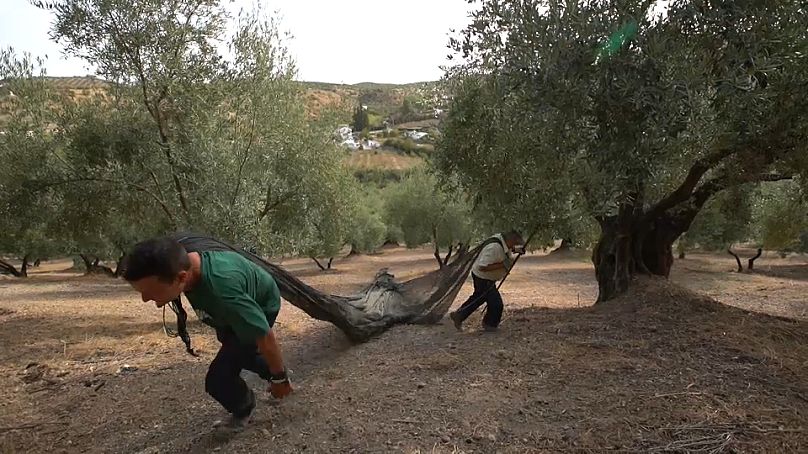Centuries-old olive trees and a superb microclimate mean Spain produces the most decorated extra virgin olive oil in the world.
Spain's southern region of Andalusia is the land of olive groves and gastronomic jewels such as table olives and Extra Virgin Olive Oil (EVOO).
This is where a large part of the 'liquid gold' -- that makes Spain the world’s largest producer of olive oil -- comes from.
Euronews takes a journey from Priego de Córdoba, a must-see region for oil lovers, to Morón de la Frontera to learn about how table olives are cured before tasting them as a tapas dish in Seville.
Liquid gold
At more than 1,000 meters of altitude, olive groves in Priego de Córdoba are difficult to access. Centuries-old olive trees and a superb microclimate produce the most awarded extra virgin olive oil in the world.
Harvesting the olives is an arduous task on challenging terrain which is too steep for mechanical assistance.
“To obtain extra virgin olive oil, olives have to be collected directly from the tree, not from the ground. From these fresh olives, the juice is extracted to make the extra virgin olive oil,” explained Francisca García González, manager DOP of Olive Oil Priego de Córdoba.
More than 260 varieties of olive are grown in Spain. Some olives are used only for oil, some are grown to be eaten and others can be used for both.
In less than one hour, the Picuda olives become virgin extra olive oil thanks to the latest technology innovation, creating a fruit juice from freshly harvested olives known since the times of the ancient Greeks as 'liquid gold.'
The oil is very aromatic. Just one taste reveals the sweetness and bitterness of the oil, while the spiciness lingers at the back of the throat.
Ancient traditions
Olives are too bitter and low in sugar to eat raw. So to discover the different ways that olives are processed, Euronews travelled to Morón de la Frontera, near Seville.
It was the Romans who came up with the technique that put the olive on the dinner table.
The olives are fermented in brine and their bitterness is neutralised in an alkaline solution before they can be eaten as simple olives. The most popular varieties to eat are Manzanilla, Gordal or Hojiblanca.
Some olives are better for making olive oil, while others are better eaten.
“The varieties that are used for olive oil are those with a high fat yield. For table olives, other characteristics such as flavour, colour, fruit quality, pulp-to-stone ratio and texture are more important,” Yolanda Rodríguez, Quality Manager Aceituna Guadalquivir told Euronews.
Once fermented, they can then be pickled, stuffed, and marinated. But the dressing, called aliño, is what makes Spanish olives special.
"Apart from making a good olive selection, designing a good recipe is important," said Yolanda Rodríguez. "For example, a good dressing should include pepper, garlic, some aroma in the brine, spices… We’re always looking for tradition.”
Visitors to the Andalucia region should not leave without trying an olive-based dish. Euronews spoke to Chef Daniel del Torro, to explore how he uses olives to envigorate his dishes.
“We are making a foam with the olives’ dressing with fennel and orange. The olive has the four basic tastes: sour, salty, bitter and sweet. And that gives any dish the "umami" we are looking for. The olive has umami," Chef Daniel del Toro told Euronews, as he prepared a creative tapas.
This ancient fruit is at the heart of Mediterranean gastronomic culture. Its savouriness together with its high level of antioxidants, vitamins and fibre makes it a perfect healthy snack, stuffed with everything you can imagine!















